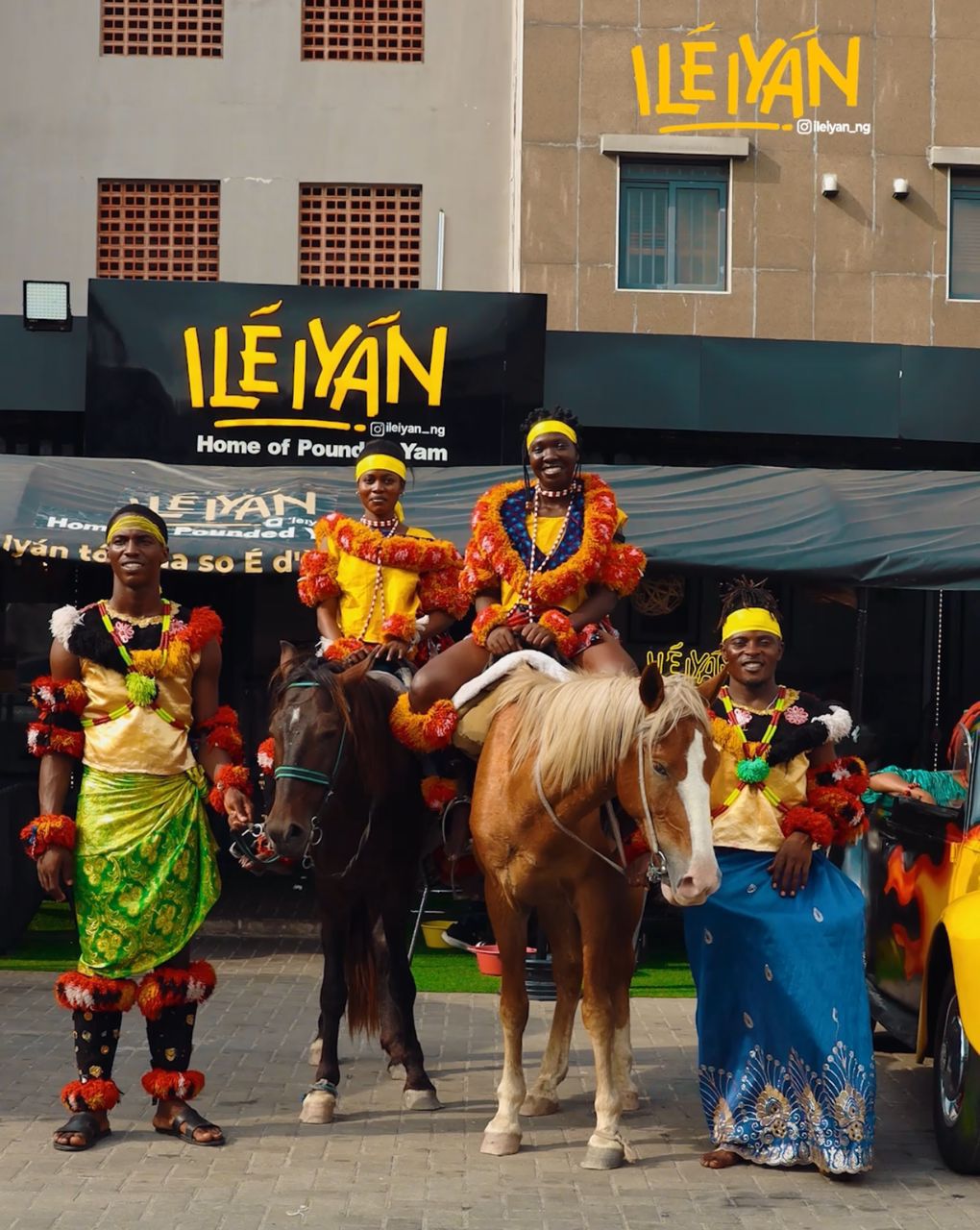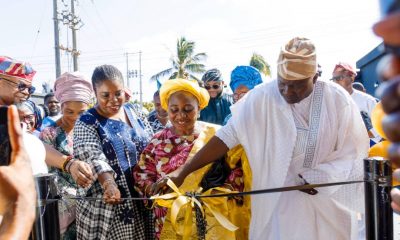Business
Hostile Takeover: A Failed Plot to Seize Control of the ILÉ IYÁN Brand”

“Hostile Takeover: A Failed Plot to Seize Control of the ILÉ IYÁN Brand”
Under the leadership of Sheriff Sanni, aka Sannikayz, ILÉ IYÁN has become an iconic brand, captivating over 12 million social media engagements worldwide and achieving remarkable growth in revenue and brand equity. This brand, recognized both locally and internationally, has served distinguished clientele, including high-net-worth individuals, government officials, corporate organizations, and A-list celebrities in entertainment. With over 15 years of experience in the hospitality industry, Sannikayz has built ILÉ IYÁN into a thriving, well-respected establishment promoting the Arts, Culture and Tourism in Nigeria and also celebrated for its excellence and integrity locally and Internationally.
Yet, in a desperate bid to silence the truth and stifle justice, brand hijackers and their paid voices have spun a web of falsehoods against Sannikayz, distorting the narrative in the public eye.
**False Claims of a Six-Month Rift with Initial Co-Founder**
The rumor mills claim that Sannikayz’s relationship with his initial investor soured within six months, suggesting a pattern of untrustworthiness with investors. In truth, this investor contributed N5M and has always maintained a warm, respectful relationship with Sannikayz till date. They both hold each other in high regard, and the surrender of shares was carried out through mutual agreement.
**Myth of Sannikayz Seeking Investment from Olasunkanmi Mustapha, aka Musty**
It is a blatant falsehood to claim that Sannikayz approached Musty for investment. In reality, Musty—through his staff Princess Michelle, a long-time customer—persistently pursued Sannikayz, keen on investing in ILÉ IYÁN’s expansion. Initially, Sannikayz was hesitant to allow Musty’s involvement, but Musty persisted, using unsolicited gifts to Sannikayz’s relatives as a ruse to appear trustworthy. This facade masked his true intent: an attempt to hijack a thriving business built on years of Sannikayz’s hard work.
**Inflated Claims of Musty’s Hospitality Credentials**
Musty’s narrative of 20 years of hospitality experience lacks any tangible proof. The restaurant he previously managed in Ikeja ended abruptly, leaving no credible brand or legacy in its wake. Unlike industry leaders with notable projects, Musty has no significant presence in the hospitality world. Hijacking ILÉ IYÁN appears to be his opportunistic plan to build a fictitious reputation on the back of another’s accomplishments.
**Unjust Share Allocation for Musty**
At the time of Musty’s entry, ILÉ IYÁN had evolved into a household name for premium pounded yam, with substantial brand value. Based on this valuation, Musty’s investment should have earned him a mere 20% share, yet Sannikayz generously granted him 30%, believing in Musty’s supposedly genuine intentions.
**Concealed Financial Gains and Exploitation of Resources**
Since his initial investment, Musty has received substantial returns: in December 2023, ILÉ IYÁN paid him N2,020,306 in profit from just the Lekki branch, followed by a total of N14,964,291 in March 2024 from both branches. Yet, Musty’s family which includes his wife Abiola Mustapha, his brother Pelumi Mustapha, his wife’s Niece and close associates Ayoola Ajuwon, Jaiyeola Ayoola-Ajuwon were placed on inflated salaries for minimal work, costing the business N4,710,000 monthly even Musty (the investor ) was earning N1,000,000 monthly. They disregarded corporate governance and fostered nepotism, placing two couples on the management team—decisions that disrespected ILÉ IYÁN’s established culture and principles.
Total payments made to investor from profit sharing and Management fees is over N30M which is close to 40% of his initial investment of N80,000,000.
**Harming ILÉ IYÁN’s Reputation**
Under Musty’s management, the Ikeja branch saw a downturn, with complaints piling up. One manager, Emmanuel Oluwabusayo, hired by Musty’s wife, even assaulted a female employee, resulting in a public scandal on a human rights blog. Despite Sannikayz’s pleas to dismiss the manager, Musty’s team retained him, prioritizing profit over integrity and brand reputation. This situation compelled Sannikayz to halt ILÉ IYÁN’s Canada expansion and return to Nigeria to address these crises.
**Exploitation of ILÉ IYÁN’s Brand Name**
Behind closed doors, Musty and his wife falsely presented themselves as owners of ILÉ IYÁN, and even attempted to position the brand as a subsidiary of Musty’s company. When asked to sign a shareholder agreement, Musty refused and instead led armed men to shut down ILÉ IYÁN’s Ikeja GRA branch, assaulting staff and deleting CCTV footage. Some of the staff were administered Post Traumatic Stress Disorder ( PTSD ) first aid and also one Emily Balogun also reported to be Injured by one of the armed men. She was also reported to suffer a neck injury during this tragic event. The Founder, Sannikayz filed a Petition against Musty at the Office of The Commissioner for Police, Lagos State Command. He later went ahead to establish a replica company, “ILÉ IYÁN by PODS,” hoping to erase the original brand and replace it with his counterfeit venture.
**Increased Costs and Employee Exploitation**
Between February and April 2024, ILÉ IYÁN was unknowingly paying salaries to Musty’s staff under the guise of management fees. These individuals increased operational costs, engaged in dubious procurement practices, and disrespected employee rights, especially targeting individuals they deemed “poor” or “female”—values antithetical to ILÉ IYÁN’s founding principles of respect and inclusivity.
Food Handlers Test and Staff Hygiene.
As part of ILÉ IYÁN’s commitment to maintaining the highest standards of food safety and customer service, all staff members are required to complete a Food Handlers Test and attend Customer Service Training periodically.
These claims are false accusations in a-bid to tarnish the ILÉ IYÁN’S brand reputation.
**The Myth of “Japa” to Canada**
It’s either ignorance or calculated malice to claim that Sannikayz abandoned ILÉ IYÁN for Canada. In fact, the plan for an international presence was mutually agreed upon to reach the Nigerian diaspora, beginning with Canada. During this official trip, Sannikayz remained in close contact with Musty, discussing registration and market strategies for the Canadian outlet.
Sannikayz also frequents Nigeria to monitor closely the growth and development of the ILÉ IYÁN Nigeria brand. This is also not limited to the his attendance at the GTbank Food and Drinks Event 2024 and other Hospitality related activities ultimately for the overall progress of the Company.
**Baseless Claims of Unpaid Debts**
Musty’s accusations of unpaid debts are not only false but an attempt to manipulate public sentiment. Outside his initial investment, no additional funds were extended by Musty’s company.
**False Allegations of Lavish Lifestyle**
In today’s social media era, Sannikayz’s lifestyle is anything but secretive. Claims of excessive spending are baseless, without any proof to support them. Sannikayz is a seasoned and prudent entrepreneur whose dedication to his business has always taken precedence.
**Musty’s Attempt to Wipe Out ILÉ IYÁN’s Legacy**
In a final move to erase Sannikayz’s legacy, Musty’s company filed a petition to dissolve ILÉ IYÁN. Yet, when confronted by Sannikayz’s legal team, Musty’s lawyers began to foot-drag with the court even awarding costs against them for time-wasting. His plan to hijack the brand through family appointments, staff mismanagement, and frivolous lawsuits fell apart, underscoring that one cannot steal another’s hard-earned success and prosper.
The ILÉ IYÁN NIGERIA brand has also made Legal action against Musty and his entities at the State and Federal High Courts for breach of contract, trust and agreement and passing off.
There are also numerous reports from other Founders who have suffered similar exploitation at the hands of Musty. His reputation for using police intimidation and scare tactics to coerce young Nigerian entrepreneurs into surrendering their businesses has left a trail of victims. This alarming trend, and the story of ILÉ IYÁN’s attempted hijacking, serves as a rallying call to protect Nigerian entrepreneurs from malicious individuals like Musty.
Business
Nigeria’s Inflation Drops to 15.10% as NBS Reports Deflationary Trend

Nigeria’s headline inflation rate declined to 15.10 per cent in January 2026, marking a significant drop from 27.61 per cent recorded in January 2025, according to the latest Consumer Price Index (CPI) report released by the National Bureau of Statistics.
The report also showed that month-on-month inflation recorded a deflationary trend of –2.88 per cent, representing a 3.42 percentage-point decrease compared to December 2025. Analysts say the development signals easing price pressures across key sectors of the economy.
Food inflation stood at 8.89 per cent year-on-year, down from 29.63 per cent in January 2025. On a month-on-month basis, food prices declined by 6.02 per cent, reflecting lower costs in several staple commodities.
The data suggests a sustained downward trajectory in inflation over the past 12 months, pointing to improving macroeconomic stability.
The administration of President Bola Ahmed Tinubu has consistently attributed recent economic adjustments to ongoing fiscal and monetary reforms aimed at stabilising prices, boosting agricultural output, and strengthening domestic supply chains.
Economic analysts note that while the latest figures indicate progress, sustaining the downward trend will depend on continued policy discipline, exchange rate stability, and improvements in food production and distribution.
The January report provides one of the clearest indications yet that inflationary pressures, which surged in early 2025, may be moderating.
Bank
Alpha Morgan to Host 19th Economic Review Webinar

Alpha Morgan to Host 19th Economic Review Webinar
In an economy shaped by constant shifts, the edge often belongs to those with the right information.
On Wednesday, February 25, 2026, Alpha Morgan Bank will host the 19th edition of its Economic Review Webinar, a high-level thought leadership session designed to equip businesses, investors, and individuals with timely financial and economic insight.
The session, which will hold live on Zoom at 10:00am WAT and will feature economist Bismarck Rewane, who will examine the key signals influencing Nigeria’s economic direction in 2026, including policy trends, market movements, and global developments shaping the local landscape.
With a consistent track record of delivering clarity in uncertain times, the Alpha Morgan Economic Review continues to provide practical context for decision-making in a dynamic environment.
Registration for the 19th Alpha Morgan Economic Review is free and can be completed via https://bit.ly/registeramerseries19
It is a bi-monthly platform that is open to the public and is held virtually.
Visit www.alphamorganbank to know more.
Business
GTBank Launches Quick Airtime Loan at 2.95%

GTBank Launches Quick Airtime Loan at 2.95%
Guaranty Trust Bank Ltd (GTBank), the flagship banking franchise of GTCO Plc, Africa’s leading financial services group, today announced the launch of Quick Airtime Loan, an innovative digital solution that gives customers instant access to airtime when they run out of call credit and have limited funds in their bank accounts, ensuring customers can stay connected when it matters most.
In today’s always-on world, running out of airtime is more than a minor inconvenience. It can mean missed opportunities, disrupted plans, and lost connections, often at the very moment when funds are tight, and options are limited. Quick Airtime Loan was created to solve this problem, offering customers instant access to airtime on credit, directly from their bank. With Quick Airtime Loan, eligible GTBank customers can access from ₦100 and up to ₦10,000 by dialing *737*90#. Available across all major mobile networks in Nigeria, the service will soon expand to include data loans, further strengthening its proposition as a reliable on-demand platform.
For years, the airtime credit market has been dominated by Telcos, where charges for this service are at 15%. GTBank is now changing the narrative by offering a customer-centric, bank-led digital alternative priced at 2.95%. Built on transparency, convenience and affordability, Quick Airtime Loan has the potential to broaden access to airtime, deliver meaningful cost savings for millions of Nigerians, and redefine how financial services show up in everyday life, not just in banking moments.
Commenting on the product launch, Miriam Olusanya, Managing Director of Guaranty Trust Bank Ltd, said: “Quick Airtime Loan reflects GTBank’s continued focus on delivering digital solutions that are relevant, accessible, and built around real customer needs. The solution underscores the power of a connected financial ecosystem, combining GTBank’s digital reach and lending expertise with the capabilities of HabariPay to deliver a smooth, end-to-end experience. By leveraging unique strengths across the Group, we are able to accelerate innovation, strengthen execution, and deliver a more integrated customer experience across all our service channels.”
Importantly, Quick Airtime Loan highlights GTCO’s evolution as a fully diversified financial services group. Leveraging HabariPay’s Squad, the solution reinforces the Group’s ecosystem proposition by bringing together banking, payment technology, and digital channels to deliver intuitive, one-stop experiences for customers.
With this new product launch, Guaranty Trust Bank is extending its legacy of pioneering digital-first solutions that have redefined customer access to financial services across the industry, building on the proven strength of its widely adopted QuickCredit offering and the convenience of the Bank’s iconic *737# USSD Banking platform.
About Guaranty Trust Bank
Guaranty Trust Bank (GTBank) is the flagship banking franchise of GTCO Plc, a leading financial services group with a strong presence across Africa and the United Kingdom. The Bank is widely recognized for its leadership in digital banking, customer experience, and innovative financial solutions that deliver value to individuals, businesses, and communities.
About HabariPay
HabariPay is the payments fintech subsidiary of GTCO Plc, focused on enabling fast, secure, and accessible digital payments for individuals and businesses. By integrating payments and digital technology, HabariPay supports innovative services that make everyday financial interactions simpler and more seamless.
Enquiries:
GTCO
Group Corporate Communication
[email protected]
+234-1-2715227
www.gtcoplc.com
-

 celebrity radar - gossips6 months ago
celebrity radar - gossips6 months agoWhy Babangida’s Hilltop Home Became Nigeria’s Political “Mecca”
-

 society6 months ago
society6 months agoPower is a Loan, Not a Possession: The Sacred Duty of Planting People
-

 society5 months ago
society5 months agoReligion: Africa’s Oldest Weapon of Enslavement and the Forgotten Truth
-

 news6 months ago
news6 months agoTHE APPOINTMENT OF WASIU AYINDE BY THE FEDERAL GOVERNMENT AS AN AMBASSADOR SOUNDS EMBARRASSING









